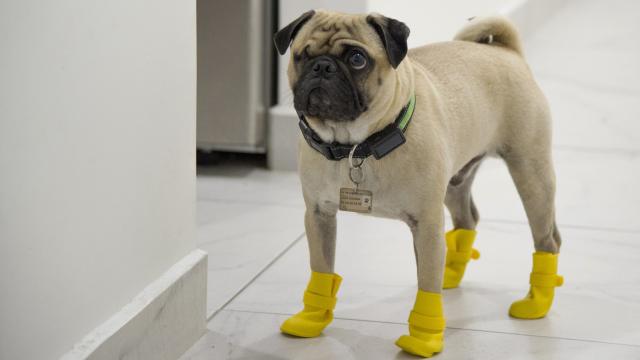A new fur-raising study about covid-19 is making the media waves, suggesting that walking your dog will raise your risk of catching the viral pandemic by a whopping 78%. But there’s plenty of reason not to take the study at face value, and your worry is better spent on other, more pressing risks.
The research was published recently in the journal of Environmental Research by a team of scientists in Spain. They conducted an online survey of over 2,000 people in the country between April and May of this year, right around the time that Spain was facing its first wave of the pandemic and had enacted a series of restrictions on movement and distancing. People were asked to answer a number of questions about their current lives, including pet ownership and whether they had ever suffered covid-19.
All told, just under 5% of survey respondents said they had contracted covid-19 at some point. And when the researchers compared rates of covid-19 between people who said they did or didn’t walk a dog (either because they didn’t have a pet or just didn’t walk theirs), those in the former camp had a slightly higher chance of reporting infection: 6.9% versus 4.2%.
From this, the researchers concluded that walking a dog “increases the risk of contagion of covid-19 by 78%.”
There are a few things to address, but right off the bat, the above wording is incorrect, even if you assume the findings are accurate. These kinds of studies are called observational research, meaning they look at patterns and trends in a real-life setting. While observational studies are a key aspect of science, one of their known limitations is that they can’t show a direct cause-and-effect relationship between the things they’re trying to observe.
At most, you could say this study suggests that walking a dog is associated with a greater risk of covid-19, not that dog-walking definitely increases your odds of infection. It’s worth asking if this phrasing is the result of something lost in translation, since the authors mention that the paper was edited by a third-party translation company.
Leaving aside the language, the actual implications of the research are iffy, too. In trying to explain the findings, the authors speculate that dogs could be transmitting covid-19 to their owners, having picked the virus from the outside world during their walks. But while dogs have been shown to carry the coronavirus and sometimes come down with illness as a result, there’s no evidence to date that dogs have then transmitted their infection to other people. Most of the time, it’s clearly the owners who have given the infection to their pups. Surface and outdoors transmission of covid-19 among people have similarly been documented but are considered rare sources of infection.
So for this theory to be true, you would need two unlikely things to happen at once — dogs getting infected by being exposed to some contaminated source outside, then giving the infection to their owner. And you would need this event to happen a lot, if you’re hoping to find a clear level of added risk. That just doesn’t really pass the sniff test, so to speak.
One other theory they present is that people who walk dogs may simply be more prone to other behaviours that increased their risk of catching covid-19. That’s more likely, sure. But the data isn’t necessarily as robust as it looks. Most glaring is that half of the documented cases of covid-19 in the study were not confirmed by an actual test and instead based on self-diagnosis. Obviously, it was much tougher to get a covid-19 test back in the spring, so that’s no one’s fault. But it makes the data collected all the shakier, as well as any of the conclusions that might arise from it.
The premise of the study wasn’t to paint dogs as a scapegoat for covid-19 but to look for any behaviour patterns that might explain a person’s risk of infection. That’s a perfectly valid goal. But when you’re looking for so many potential patterns, sometimes you end up finding things that only seem genuine at first glance.
Is it possible that dogs have been silent carriers of the pandemic this whole time? Few possibilities are ever truly dismissed in science. But scientists usually apply a basic sense of plausibility to the things they discover, based on what we already know. If dogs were a major source of infection, there would probably be lots of evidence from other studies suggesting as much, which there isn’t. So for now, it’s more likely that this study is a one-off fluke than a concrete reason to keep a mask on your precious pooch at all times (that said, if you do contract covid-19 and own pets, then taking precautions on their behalf is advised).
Besides, even in this study, walking dogs wasn’t the most high-risk activity linked to catching covid-19 — it was sharing a home with someone else who had caught it. Those living with a covid-19 victim were 60 times more likely to contract the viral illness than those without one in their home. Unfortunately, that’s an added risk that’s supported by a lot of evidence, and one much harder to avoid than simply not walking your dog.
